 |
 |
|
Vietnamese Dishes Tourists can enjoy Vietnamese food everywhere at deluxe restaurants or even at street cafes. As you travel up or down the country; you will notice sharp differences in both main dishes and snacks eaten by locals. It 's one of the joys of traveling in the country; and it 's a good idea to ask your guide to point out interesting things to eat.
In Vietnam; Pho is mostly a restaurant food. Though some people prepare it at home; most prefer going to noisy soup shops. Here are a few tips: - Pho comes with a variety of toppings including
rare beef; well-done beef and slices of brisket; tendon; tripe and
even meatballs. If you are a novice; try pho Tai Chin; which includes
the rare and well-done beef combination.
Hue people enjoy beef-vermicelli in their own
way and the food here is a combined art of something fashionable,
something very popular. Hue connoisseurs rarely enjoy the food in
well-decorated restaurants, and an eating place frequented by tourists
is opposite to city post-office on Ly Thuong Kiet Street. Beef-vermicelli
is consumed here day and night, the broth-pot is kept boiling but
this is not the most visited one because Hue city folks only have
beef-vermicelli in the morning and they have their own choice. Fresh
vegetables are inseparable and vermicelli seems to have just gone
out from producer's, and the flavor of the snack could be found
nowhere else. Ask for hu tiu at any Chinese restaurant that serves dim sum (breakfast),
and you 'll have a hot bowl of white noodles whose flavor will make
your mouth water. On top of the noodles are slices of pork, and
on top of the slices are lettuce leaves. Chinese cooks often add
small cubes of fried fat to make their hu tiu more delicious.
To Hanoi people, the taste of Cha Ca remains as
it was. To have tasty pie, shopkeepers have to select good fish
(normally Lang fish) with solid fresh, less bones and good scent.
Processed fish is mixed in fish sauce, pepper, galingale, saffron
and rice-ferment. Then put on a fire-tongs and grilled right on
the eaters' table. Eaters, while eating, have to fan the fire, turn
upside down to make both sides baked. Then they put the fish into
a bowl of boiling fat and consumed with rice vermicelli, groundnuts,
spices, dried rice-cake, sliced onion leaves, some drops of lemon
juice and a little coleopteran.
The experienced housewives normally serve their family with this kind of food. There must be fresh water fish (trout, gudgeon, and catfish). Sometimes, salt water fish can be used instead, but there must be good fish with solid flesh. Processed fish (cut horizontally not vertically) is mixed with fish sauce, ginger and spices, and then put into an earthen pot and cook o small fire until dry. Cooked fish must be solid, not soft and the scent of spices make the food more attractive, even the bones have to be cooked until soft, so eaters feel satisfied when eating.
Apart from green-rice, Hanoi people are skilled in preparing other dishes from green-rice sticky rice such as sweet rice-soup, and rice-pie... Each has its own specialty, but all are fascinating. Sticky rice is plentiful in types: banana flavor, coconut-leaf, sesame and coconut, sausage, back-peas, green-peas, maize and mixed sticky rice...are just a few in 3 parts to name. Nep than, nep cai hoa vang are best flavors to make rice and wine.
What a marvel it's when one stays on a floating
boat, by side of smelling hot-pot cooked with fish caught by himself.
Fish is caught from rivers or ponds. The fisherman maybe Anh Ba
or Anh Nam or so promptly, he drops dead the fish and Ms Ba or Ms
Nam or so gets it cleaned and boiled in a pot. Spices are inseparable
with the fish. Hot-pot is the flavored only with certain spices.
One or two days before Tet; the family gather
to prepare and cook the rice cakes around the warm fire. "Banh
Chung" is made of glutinous rice; pork meat and green bean
paste; and is wrapped in a square of "Dong" leaves (rush
leaves) giving the rice a green color after boiling for ten hours. It is easy to find Banh Xeo in the South provinces.
Muoi said that first she mills the mix of rice and cold rice after being cooked into flour before pouring the flour into a mould that has nearly 50 small holes in the shape of a half circle. After that, she adds dried shrimp and fresh shrimp to the holes. Diners can eat the dish after the mix 's skin becomes yellow. Rolling the banh khot with vegetables and using fish sauce is the feasible way to enjoy the banh khot, she said, adding that a banh khot dish contains 8-10 pieces.
Designed in the form of a cylinder, with large windows looking
out onto the street, a skylight set in the high, sloping roof to
let in a little sunlight, and polished cement floors, Wrap and Roll
feels chic, modern and fresh. Decorated in yellow, green and orange,
the restaurant reflects the fresh colors of its specialties.
Vietnamese
vegetarian cooking (an chay) has a long history and is an integral
part of Vietnamese cuisine. In general, the focus of vegetarian
cuisine in Vietnam has been on reproducing traditional dishes prepared
with meat, chicken, seafood or egg without including these ingredients.
Instead, tofu, mushrooms and raw, dried, cooked and fermented vegetables
are used.
The little packages usually are shaped like pyramids
with square bottoms. Then people arrange the packets into a pot
for steaming.
Sour soup vermicelli is for eating any time of
the day. It is served for breakfast, lunch or dinner or it can be
a temporary dish between two meals. In particular, it is a favorite
of women.
To serve it, you should put vermicelli into your bowl, dip it in the snail soup with a few snails and some chilly. It must be served hot to appreciate its full flavor.
Today vegetarian dining is becoming more and more popular not only
because it is associated with health benefits but it also offers
fine and exotic dishes. The vegetarian cuisine has great diversity
and is a true culinary art. Two of Saigontourist's restaurants have
made a name for themselves with this cuisine.
Grilled food or grills for short is closely related to the floating life of the cultivators. It might be that the first settlers (in their cultivation process) found good smell and taste in grilled fish, duck, chicken or something else. Nowadays, grilled food is more and more improved; however it remains as it was called. Apart from originally grilled food: fish, chicken, today people invent more grills: pork (consumed with vermicelli), wild pigs... need more skills. But don't forget that beef is rolled in la lot (kind of spices) to be grilled or cods to be in banana leaf, eels in mulberry leave... Ways to grill are uncountable, even a chicken can be grilled
(with hair on) and coated with clay. It's not only satisfactory
to your taste but to your eyes and noses...
Today vegetarian dining is becoming more and more popular not only
because it is associated with health benefits but it also offers
fine and exotic dishes. The vegetarian cuisine has great diversity
and is a true culinary art. Two of Saigontourist's restaurants have
made a name for themselves with this cuisine.
"Some mushrooms need to be cooked long enough to absorb the flavor from the broth, which is a mixture of mushrooms, Chinese herbs, and pork bones that have been cooked for more than 10 hours," Kim Anh said. When the mushrooms were ready, the waitress poured some soup into a small bowl of seasoning powder and then placed the mushrooms and meat into our bowls. Ashima Mushroom Hot Pot
The recipe calls for the steak to be cooked medium-rare,
never well-done. If overcooked, the meat will lose much of its precious
fat. It can be grilled with vegetables, which can be served with
homemade sauces or condiments like Tabasco or horseradish sauce.
The dish is served as a main course for both home parties and dinners.
To eat it, you break a piece off with chopsticks and wrap it in fresh mustard greens with fresh green herbs, slice of green banana and green fig, and dip it in sauce. The fresh leaves, which include the spicy, red-tinged cumin leaf, help to cut through any oiliness in the fried dish, as does the sourness of the banana and fig, which are also digestive aids.
This dish 's ingredients include rice, vegetables and meat. After being soaked in water, the rice is ground to a fine powder and made into attractive smooth white noodles. Accompanying vegetables are water morning-glory, cress, young banana flowers and herbs. Especially, the famous Tra Que savory of Quang Nam Province will give the dish more flavor. You can use pork, chicken, fish, crab or shrimp to make the broth. If chicken is chosen, the meat is separated, seasoned and stir-fried while the bones are stewed. Finish the stock by adding cooked chicken meat. Some well-known Quang Noodle Kiosks in Danang City:
To serve it, you should put some species in cakes such as pounded shrimp, some cooking oil. The sauce for this kind of cake is very important. It is made of fresh shrimp so it is both sweet and fat. And you should enjoy thin cakes with some chilly. Thin cakes are also served in "King's meals" for tourists
and in "royal ones" for beloved guests.
The broth obtained after boiling the mussels is used to flavor
the rice. Ginger, sesame, and chili are also added to the broth.
This dish is very spicy and it is not rare to see people with watery
eyes and sweaty faces while eating it; nevertheless, everyone congratulates
the cook for such a delicious meal.
The boiled meat must be well done and the pure color of its fat retained. Pork is boiled in medium fire so that it is not well done so soon. Utensils must be rinsed before touching the meat to maintain its flavour and hygiene. Except for vegetables, fresh onion and green pip bananas, other additional things including fried “banh trang”, noodles (made by rice flavor to roll with boiled pork) are made for hygienic requirements. Hot fish sauce will make the dish more special. Some kiosks in Danang City:
There at the West Lake, a diner could take each bite of the cake accompanied by a drink of cold beer, and enjoy the nice smell coming from the stove and the cool wind blowing from the lake. Now, you may seek somewhere in your memory the fairy tale about the Golden Buffalo who, on the way to look for his lost mother, created the West Lake. The shrimp fried pancake of West Lake now still keeps its traditional
flavour and taste: hot, cracker cake dipped in skillfully made sauce
which is sweet, sour and spicy.
This cake comes in two varieties, one made from
corn flour, the other from rice flour. Other ingredients include
water, peanuts and lime juice and the finished cake is soft, smooth
and colourless. As a frugal but nutritious meal, banh duc is often
eaten with steamed meat, seeds and salt.
Food preservatives are added to the flour to make the sheets of rice softer and smoother. A screen of cloth, used to mould the rice sheets, is placed over the opening of a pot of boiling water. Flour is spread on the screen and then covered with a lid. After a few minutes, a bamboo stick is used to strip the thin layer of flour off the screen, and it is rolled up and sprinkled with fried anions. All of the ingredients are stir-fried, put into a banh cuon, and then rolled up.
is a specialty of Lang Son province, especially roast duck of That Khe. Duck is killed and plucked, then some ingredients of which Mac Mat leaf is special, will be placed inside and the duck will be re-mended. After that, duck is put into boiling ground-nut oil or fat to be roast until it turns crisp. Roast duck have crisp skin and delicious flavor.
In the South, corn is often stripped off the cob and fried in oil.
The kernels are mixed with meat or vegetables and served as a full
meal. While fried corn is delicious, nothing beats the smell and
taste of roasted corn on a wintry Hanoi evening.
Ingredients used for Nem Ran comprise of lean minced
pork, sea crabs or unshelled shrimps, two kinds of edible mushroom
(Nam Huong and Moc Nhi), dried onion, duck eggs, pepper, salt and
different kinds of seasoning. All are mixed thoroughly before being
wrapped with transparent rice paper into small rolls. These rolls
are then fried in boiling oil.
In addition from the above ingredients, we can make grilled nem
and fried nem. For grilled nem, divide the mixture into meatballs
and thread the meatballs onto the bamboo skewers. This dish can
also be made in another way by covering the meatballs in a banana
leaf and grill them. This dish is called "nem lui" which
is not less delicious than "nem nuong".
It can cost US$20 for a royal party but it could take you a year to wait for a Hue-style meal comprised of salt and rice. Such a meal is only prepared on special days for Hue families, or when they welcome special guests. Hue households take enormous effort in preparing a unique meal with around 20 salt dishes cooked with different flavors. Rice and salt, familiar and simple ingredients for any Vietnamese family, is subjected to culinary alchemy. Roasted salt soaked with grease, dried salt mixed with pepper, salt stewed with chilli, salt dried with citronella, salt mixed with ruoc tom (shredded shrimp), the list goes on...
First, the cudweed is washed, ground and then mixed with husked glutinous rice. Green beans, that are flayed and turned into paste after being cooked, are then added to the mixture. Finally, the cakes are sprinkled with grains of glutinous steamed rice.
(Source: www.vietnamtourism.com.vn; www.vietnamtravelguide.com)
|
2L-2M-2N Pham Huu Chi Street, Ward 12, Dist. 5, Ho Chi Minh City, Vietnam Tel: (08) 3855 6666 * Fax: (08) 3855 5588 * Email: vyp@yp.com.vn Branch office : 28 Dinh Bo Linh Street, Phu Cuong Ward, Thu Dau Mot Town, Binh Duong Province • Tel: (0650) 3855 855 • Fax: (0650) 3855 555 License No 221/GP - BC, dated December 9th, 2005. Main responsibility: Mrs. Pham Thi Kim Tuyet Loan - General Director. |
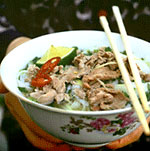 For Vietnamese; Pho is life; love and all things that matter.
For Vietnamese; Pho is life; love and all things that matter.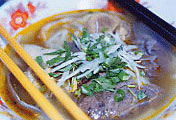
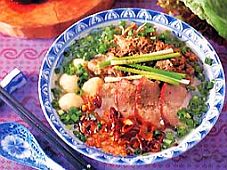
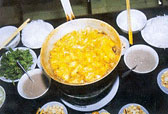 The
inventor of this fish-pie came from Doan family on Hang Son Street,
Hanoi. In 19th century, Hanoi people normally baked pork, but he
baked fish-unstinking fish to make fish-pie. Hanoi people then soon
got infatuate it and his eating-house turned prosperous. Henceforth,
the name of the street was changed into Cha Ca (fish-pie) from its
former name Hang Son (Paint Street) due to success of his eatery.
The
inventor of this fish-pie came from Doan family on Hang Son Street,
Hanoi. In 19th century, Hanoi people normally baked pork, but he
baked fish-unstinking fish to make fish-pie. Hanoi people then soon
got infatuate it and his eating-house turned prosperous. Henceforth,
the name of the street was changed into Cha Ca (fish-pie) from its
former name Hang Son (Paint Street) due to success of his eatery.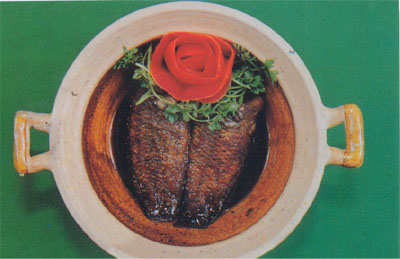 Earthen
pot-cooked rice and fish is a popular food in Vietnam, from North
to South.
Earthen
pot-cooked rice and fish is a popular food in Vietnam, from North
to South.
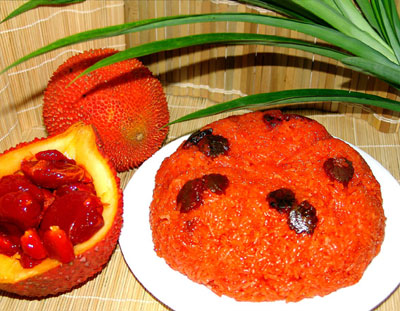

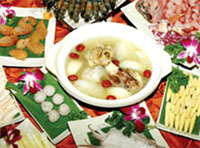
 Banh
Chung or square rice cake is a Vietnamese traditional dish most
commonly found during the "Tet" New Year celebration.
Every Vietnamese family must have "Banh Chung" among their
offerings to be placed on the ancestors' altars.
Banh
Chung or square rice cake is a Vietnamese traditional dish most
commonly found during the "Tet" New Year celebration.
Every Vietnamese family must have "Banh Chung" among their
offerings to be placed on the ancestors' altars.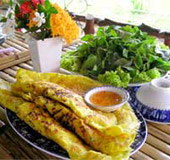

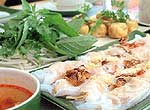
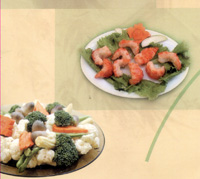

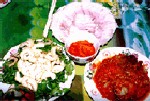

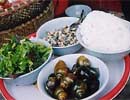 Snail
soup with vermicelli, a delicacy popular to the Vietnamese, may
be found at any time and any place, both in the city and in the
countryside. It is a delicate, yet very simple and popular disk
- a snack for all people irrespective of their wealth
Snail
soup with vermicelli, a delicacy popular to the Vietnamese, may
be found at any time and any place, both in the city and in the
countryside. It is a delicate, yet very simple and popular disk
- a snack for all people irrespective of their wealth 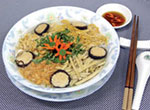 The
first month of the lunar year is traditionally a good month of vegetarian
dining for Asian people who use it as an occasion to pray for good
things for themselves and their families and friends.
The
first month of the lunar year is traditionally a good month of vegetarian
dining for Asian people who use it as an occasion to pray for good
things for themselves and their families and friends. 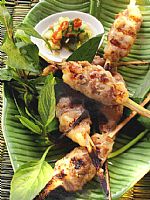
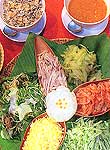 Bun
ca is a specialty of Phan Thiet. It is usually served in a single
bowl, but at Sea Breeze the chef has updated the presentation of
this traditional dish, allowing patrons to assemble their own perfect
bowl of bun ca by presenting the ingredients on a bed of banana
leaves. At Sea Breeze, when you order bun ca you are served a platter
featuring a handful of ca suot (a fish indigenous to Phan Thiet),
a handful of boiled pork, thinly sliced fried eggs, star fruit,
cucumber and fresh mixed vegetables, alongside a plate of vermicelli,
a bowl of banh da (rice cake) pieces and, most importantly, a bowl
of sauce.
Bun
ca is a specialty of Phan Thiet. It is usually served in a single
bowl, but at Sea Breeze the chef has updated the presentation of
this traditional dish, allowing patrons to assemble their own perfect
bowl of bun ca by presenting the ingredients on a bed of banana
leaves. At Sea Breeze, when you order bun ca you are served a platter
featuring a handful of ca suot (a fish indigenous to Phan Thiet),
a handful of boiled pork, thinly sliced fried eggs, star fruit,
cucumber and fresh mixed vegetables, alongside a plate of vermicelli,
a bowl of banh da (rice cake) pieces and, most importantly, a bowl
of sauce. At
Ashima Mushroom Hotpot restaurant, even the most reluctant diners
end the night begging for more. Although Ashima also uses Vietnamese
mushrooms, most of the mushrooms are imported and were discovered
by Kim Anh and her friends while travelling.
At
Ashima Mushroom Hotpot restaurant, even the most reluctant diners
end the night begging for more. Although Ashima also uses Vietnamese
mushrooms, most of the mushrooms are imported and were discovered
by Kim Anh and her friends while travelling. Seared
wagyu beef cubes with red and yellow capsicum coulis
Seared
wagyu beef cubes with red and yellow capsicum coulis 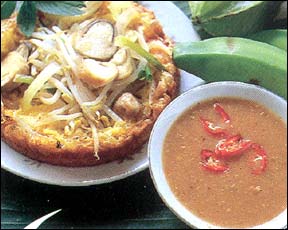
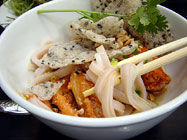 As
"pho" is to Hanoi and beef rice noodles is to Hue, Quang
noodles is very popular in Quang Nam and Danang.
As
"pho" is to Hanoi and beef rice noodles is to Hue, Quang
noodles is very popular in Quang Nam and Danang.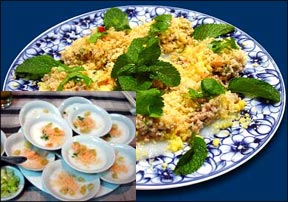 Thin
cakes are made of sweet rice in the shape of duckweed. In fact,
making this kind of cake is not complicated. Rice must be ground
in to fine powder. Then the cook steeps this powder in water in
a few minutes to turn it into a moderately viscid and liquid powder.
At the third step, the liquid will be put in small cups and then
on gridiron for steaming.
Thin
cakes are made of sweet rice in the shape of duckweed. In fact,
making this kind of cake is not complicated. Rice must be ground
in to fine powder. Then the cook steeps this powder in water in
a few minutes to turn it into a moderately viscid and liquid powder.
At the third step, the liquid will be put in small cups and then
on gridiron for steaming.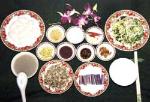 Hot
white rice is part of every meal in Vietnam, but only Hue mussel
rice is served cool. Hue people, after deciding that no food should
be wasted, have designed this dish using leftover rice.
Hot
white rice is part of every meal in Vietnam, but only Hue mussel
rice is served cool. Hue people, after deciding that no food should
be wasted, have designed this dish using leftover rice.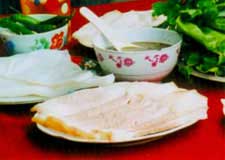 You should make the rolls yourself from boiled pork, vegetables
and noodles. Just roll the ingredients in soft "banh trang"
and dip them in spicy fish sauce
You should make the rolls yourself from boiled pork, vegetables
and noodles. Just roll the ingredients in soft "banh trang"
and dip them in spicy fish sauce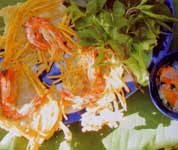 The best time to enjoy shrimp pancake at West Lake is at sunset
in summer. The pink shrimp (from the West Lake fresh water) on light
brown crackers and the sweet, sour and spicy sauce all remind you
of the aroma of the countryside.
The best time to enjoy shrimp pancake at West Lake is at sunset
in summer. The pink shrimp (from the West Lake fresh water) on light
brown crackers and the sweet, sour and spicy sauce all remind you
of the aroma of the countryside. 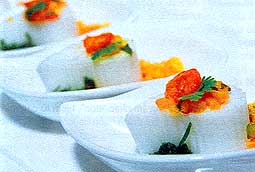 Duc
is a popular kind of steamed savory cake, which originated in northern
Vietnam. In Hanoi, banh duc is usually sold at small food stalls
and can be eaten throughout the day as a snack.
Duc
is a popular kind of steamed savory cake, which originated in northern
Vietnam. In Hanoi, banh duc is usually sold at small food stalls
and can be eaten throughout the day as a snack.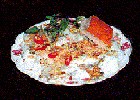 A breakfast of banh cuon is a favourite of the Vietnamese. It is
made of rice flour, from thoroughly selected grains. The rice is
soaked overnight, and ten ground with stone mortar.
A breakfast of banh cuon is a favourite of the Vietnamese. It is
made of rice flour, from thoroughly selected grains. The rice is
soaked overnight, and ten ground with stone mortar.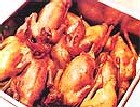
 Walk
through the streets of Hanoi in the winter and you are sure to pass
vendors huddled over small hibbachis, roasting corn-in-the-cob.
The sweetest sticky corn comes from the Red River Delta and is roasted
in its husk over wood coals. Roasted corn makes a perfect warming
snack.
Walk
through the streets of Hanoi in the winter and you are sure to pass
vendors huddled over small hibbachis, roasting corn-in-the-cob.
The sweetest sticky corn comes from the Red River Delta and is roasted
in its husk over wood coals. Roasted corn makes a perfect warming
snack.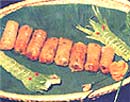 This dish is called Nem Ran by northerners and Cha Gio by southerners.
In Hanoi, the introduction of Nem Ran dates back to a time when
Cha Ca had not existed. Although it ranks among Vietnam's specialty
dishes, Nem Ran is very easy to prepare. Consequently, it has long
been a preferred food on special occasions such as Tet and other
family festivities.
This dish is called Nem Ran by northerners and Cha Gio by southerners.
In Hanoi, the introduction of Nem Ran dates back to a time when
Cha Ca had not existed. Although it ranks among Vietnam's specialty
dishes, Nem Ran is very easy to prepare. Consequently, it has long
been a preferred food on special occasions such as Tet and other
family festivities.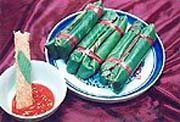 It
takes a lot of time to make nem chua. Pork add salt,
sugar and other seasonings. Mix thoroughly until it becomes completely
smooth but stiff paste. Finally add some pepper seeds to the mixture.
Slice boiled pig skin into small threads and put them into the meat
moisture and pound well. Divide the mixture in to 2 finger- shaped
pieces, put it on banana leaf and cover it up closely for 2-3 days.
It is best served with fresh garlic.
It
takes a lot of time to make nem chua. Pork add salt,
sugar and other seasonings. Mix thoroughly until it becomes completely
smooth but stiff paste. Finally add some pepper seeds to the mixture.
Slice boiled pig skin into small threads and put them into the meat
moisture and pound well. Divide the mixture in to 2 finger- shaped
pieces, put it on banana leaf and cover it up closely for 2-3 days.
It is best served with fresh garlic.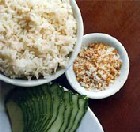
 Banh
khuc is a traditional cake of Vietnam. It’s a rice ball made from
glutinous rice, green bean, pork, spices and, most importantly,
cudweed (khuc).
Banh
khuc is a traditional cake of Vietnam. It’s a rice ball made from
glutinous rice, green bean, pork, spices and, most importantly,
cudweed (khuc).